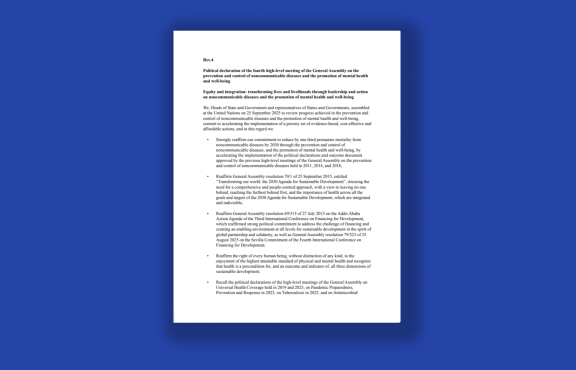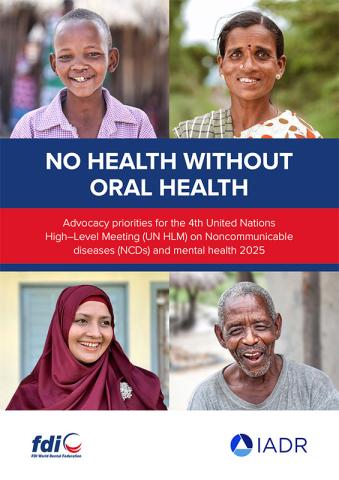Oral health and noncommunicable diseases
Adopting a common risk factor approach
Noncommunicable diseases (NCDs), also known as chronic diseases, are one of the major challenges for health and sustainable human development. To date, the global NCD response has focused on the four major NCDs – cardiovascular (heart) disease, cancer, diabetes, and chronic respiratory diseases. However, there is a range of other conditions, including oral diseases, that are linked to the four most prominent NCDs. In fact, oral diseases are among the most common and preventable NCDs worldwide, and they are generally related to the same risk factors associated with over 100 NCDs.
Oral diseases and other NCDs share modifiable risk factors, including tobacco use, harmful use of alcohol and unhealthy diets, as well as the same socioeconomic determinants. Accordingly, it is essential to adopt a common risk factor approach and fully integrate oral health into NCD prevention and control and broader health strategies. With the growing burden of oral disease and NCDs worldwide, there is an urgent need for local, national, regional, and global action.


UN Political Declaration on NCDs and Mental Health 2025
Political Declaration of the fourth High-level Meeting of the United Nations General Assembly (UNGA) on NCDs and Mental Health
UN Political Declaration on NCDs and Mental Health 2025
For the first time in a UN meeting on NCDs, oral diseases were explicitly referenced in the Political Declaration of HLM4, appearing in both the preambular (pages 2 and 6) and operative (pages 10 and 11) sections.
This achievement did not come easily. The initial Zero Draft of the Declaration made no mention of oral health. Through concerted action, FDI mobilized its leadership, National Dental Associations, and a wide network of allies across health organizations, missions, and governments to advocate for inclusion. Thanks to these coordinated efforts, oral health was ultimately recognized in the final text, a testament to the power of sustained, unified advocacy.
The Declaration also introduced a set of fast-track targets to be achieved by 2030:
- 150 million fewer tobacco users,
- 150 million more people with controlled hypertension, and
- 150 million more people with access to mental health care.
Additionally, the Political Declaration called for stronger regulatory measures on e-cigarettes and novel tobacco products, restrictions on the marketing of unhealthy foods to children, the implementation of front-of-pack nutrition labelling, and the elimination of industrially produced trans fats.
No Health without Oral Health
The fourth UN HLM on NCDs (HLM4) will take place on Thursday, 25 September 2025 in New York with the theme “Equity and Integration: Transforming lives and livelihoods through leadership and action on NCDs and mental health”. At this meeting, Heads of States and governments will assess the progress made since HLM3 in 2018. HLM4 will also set a vision to prevent and control NCDs towards 2030 and 2050 through a political declaration that will be negotiated by governments.
HLM4 presents a unique opportunity for governments to adopt a bold, action-oriented, and achievable agenda on NCDs, including oral health.
FDI is mobilizing all stakeholders with interest in oral health ahead of HLM4 through coherent and aligned recommendations for governments. It has collaborated with the International Association for Dental, Oral and Craniofacial Research (IADR), to develop advocacy priorities specific to oral health.

UN Political Declaration on NCD 2018
Political Declaration of the High-level Meeting of the General Assembly on the Prevention and Control of Non-communicable Diseases.
UN Political Declaration on NCDs 2018
Though not an area of major focus historically, oral health and NCDs have garnered renewed attention and increased political momentum in recent years. The turning point for the oral health and NCD community was in 2011 with the adoption of the United Nations (UN) Political Declaration on the Prevention and Control of NCDs. For the first time, NCDs were recognized as a global health priority and oral diseases were specifically referenced as a major health burden. The Declaration was also a step forward in recognizing that oral health and NCDs do not exist in isolation from one another and can benefit from a comprehensive and integrated response.
To accelerate action on oral health and NCDs, FDI works closely with our members and network of established partners. We prioritize collaboration with other health areas, especially NCDs. For this reason, FDI collaborates with the NCD Alliance – one of our strategic partners – so that together we can accomplish common goals by tackling cross-cutting issues (such as co-morbidities and common risk factors) to improve oral health and reduce the NCD burden.

